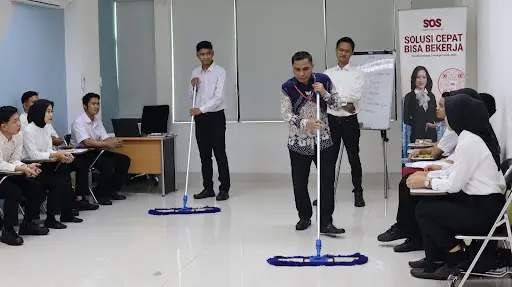8 Key Responsibilities of HR Staff to Support Employee Management

Team Shield On Service
Editorial
23 April 2025

In the professional world, human resource management plays a crucial role as a foundation for organizational success. One of the essential roles in this field is the HR staff, who ensures order and efficiency in managing employees. However, many still don’t fully understand the scope of HR staff responsibilities and their impact on the company's operations.
In this article, you'll discover eight essential HR staff responsibilities, the skills needed to perform them effectively, and the best solutions to help your business grow.
8 Key Responsibilities of HR Staff
HR staff play a vital role in building a healthy and productive work system. More than just administrative tasks, HR responsibilities cover strategic aspects of human resource management.
Here are the core HR staff responsibilities you should know and understand in detail:
1. Managing Employee Data
One of the most fundamental responsibilities of HR staff is to organize and update employee records accurately. This includes personal information, work history, contracts, and daily attendance. Well-managed data helps streamline HR analysis and management decision-making.
2. Handling Recruitment and Selection
HR staff are crucial in ensuring a smooth and efficient recruitment process, from posting job vacancies and screening applications to scheduling interviews with hiring managers. This process directly affects the quality of human resources entering the company.
3. Managing Employee Administration
HR staff handle important administrative tasks such as preparing and filing employment agreements, warning letters, promotions, and resignation documents. All of these must be organized according to labor regulations and maintained properly.
Read Also: 10 Call Center Skills to Improve Customer Satisfaction
4. Facilitating Training and Development
HR staff must be able to design and manage employee training programs to enhance their skills. Both internal and external training aim to boost efficiency and productivity, making the workforce more competitive and prepared for challenges.
5. Resolving Employee Issues and Complaints
HR staff are responsible for resolving internal issues, including conflicts between employees or complaints about work systems. Acting as fair and wise mediators, their conflict-resolution skills help maintain a conducive and productive work environment.
6. Conducting Employee Performance Evaluations
Regular performance reviews are essential for employee development. HR staff are in charge of creating evaluation indicators and coordinating routine assessments, which are used for rewards, promotions, and identifying training needs.
7. Managing Attendance and Leave
HR staff must oversee attendance, annual leave, sick leave, and other permissions. They ensure real-time updates of attendance data, which is crucial for calculating benefits or salary deductions. Accurate tracking greatly influences employee satisfaction and cost efficiency.
8. Ensuring Legal Compliance in HR Practices
HR staff must ensure that all HR processes and policies align with current laws and regulations, including employee rights, social security (BPJS), and labor law compliance. Non-compliance can result in legal issues and damage to the company's reputation.
Read Also: 7 Benefits of Outsourcing for Businesses
Essential Skills for HR Staff
To effectively perform HR responsibilities, a combination of technical and interpersonal skills is necessary. Without the right skills, HR staff may struggle to contribute meaningfully to business growth.
Here are the key skills every HR staff should possess:
1. Effective Communication
The ability to communicate clearly and professionally with management, employees, and external parties is crucial. Good communication helps resolve issues quickly and maintains harmonious work relationships.
2. Time Management
HR staff must prioritize tasks and meet tight deadlines—such as scheduling interviews, completing reports, and managing administrative tasks. Strong time management skills are essential for daily productivity.
3. Understanding of Labor Laws
Knowledge of labor laws—including employee rights, minimum wage regulations, and contract management—is critical. Misunderstanding legal requirements can lead to costly legal and financial consequences.
4. Administrative Skills
Dealing with numerous important documents requires precision. Meticulous record-keeping ensures data integrity and supports smooth auditing and decision-making processes.
5. Problem-Solving Skills
HR staff encounter various issues daily—from internal conflicts to complaints and operational challenges. Strong problem-solving skills contribute to creating a dynamic and healthy workplace.
HR staff responsibilities are diverse and play a key role in ensuring smooth operations and employee well-being. From data management and recruitment to conflict resolution, these functions must be executed with professionalism. To ensure all HR aspects run optimally, your company needs competent and well-trained HR staff.
Read Also: The Importance of Customer Service in Increasing Customer Satisfaction
Trust Your HR Staffing Needs to SOS
If you're facing challenges in managing your workforce or don’t have a reliable internal HR team, it’s time to partner with a trusted provider like SOS.
SOS offers highly trained manpower services, including HR staff, to help optimize and enhance your operations.
With our integrated workforce solutions and industry-standard personnel, your business can grow efficiently and productively. Contact the SOS today and discover the best HR staffing solution tailored to your business needs!



